Key takeaways:
- Critical thinking is crucial for effective decision-making in healthcare, enhancing patient safety and care dynamics.
- Engaging in peer discussions and reflecting on experiences fosters collaborative learning and deepens understanding.
- Real-life applications, such as simulations and ethical discussions, significantly improve critical thinking skills in healthcare education.
- Personal growth in critical thinking is a nonlinear journey involving both challenges and breakthroughs.
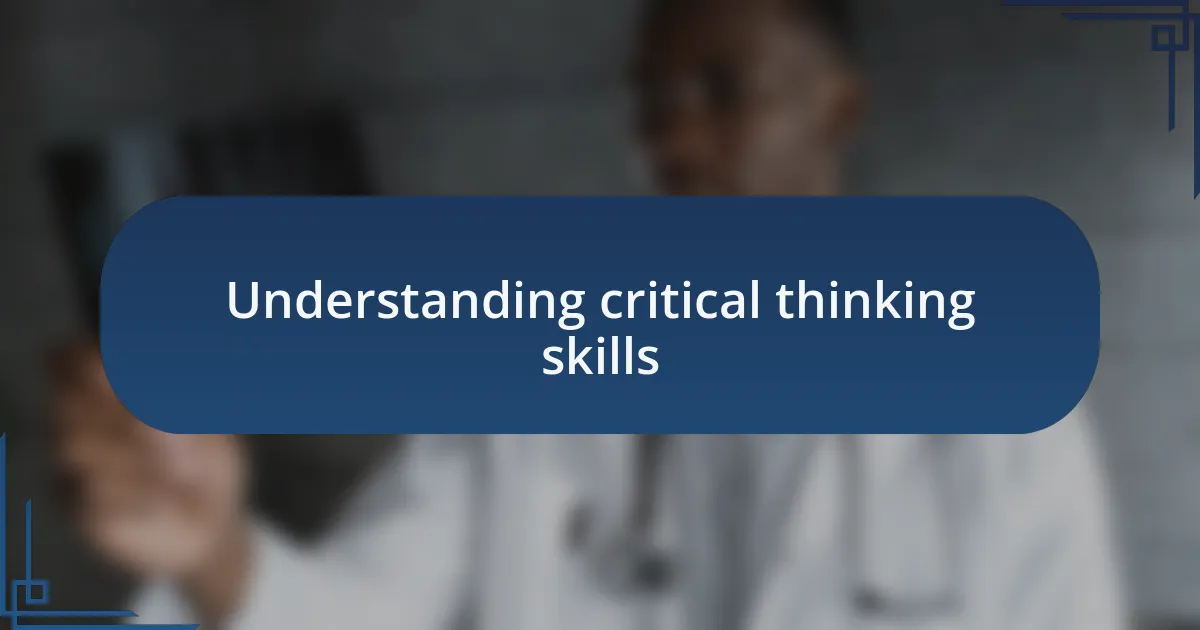
Understanding critical thinking skills
Critical thinking skills are essential in today’s complex healthcare landscape, where quick, informed decisions can impact patient outcomes. I remember a situation in a past clinical rotation where a patient presented with ambiguous symptoms. It was through careful analysis and questioning that I pieced together the clues, ultimately leading to a diagnosis that not only saved valuable time but also alleviated the patient’s anxiety. This experience made me realize how vital critical thinking is in ensuring safety and efficacy in patient care.
I find myself often reflecting on the role of critical thinking in collaboration with other healthcare professionals. For instance, during team meetings, I’ve noticed how a well-placed question can shift the entire conversation, guiding us towards more innovative solutions. Why is it that some people navigate these discussions more adeptly than others? It often comes down to the ability to evaluate evidence critically, weigh diverse perspectives, and challenge assumptions, which is something I’ve learned to embrace over time.
Ultimately, critical thinking isn’t just about analysis; it’s about perspective and empathy as well. I’ve had moments where stepping back and viewing a situation through the eyes of both a patient and a provider enriched my understanding of care dynamics. Isn’t it fascinating how these skills can foster deeper connections and enhance our approach to problem-solving? By continuously honing my critical thinking abilities, I’ve experienced not only personal growth but also a heightened sense of commitment to my role in healthcare.
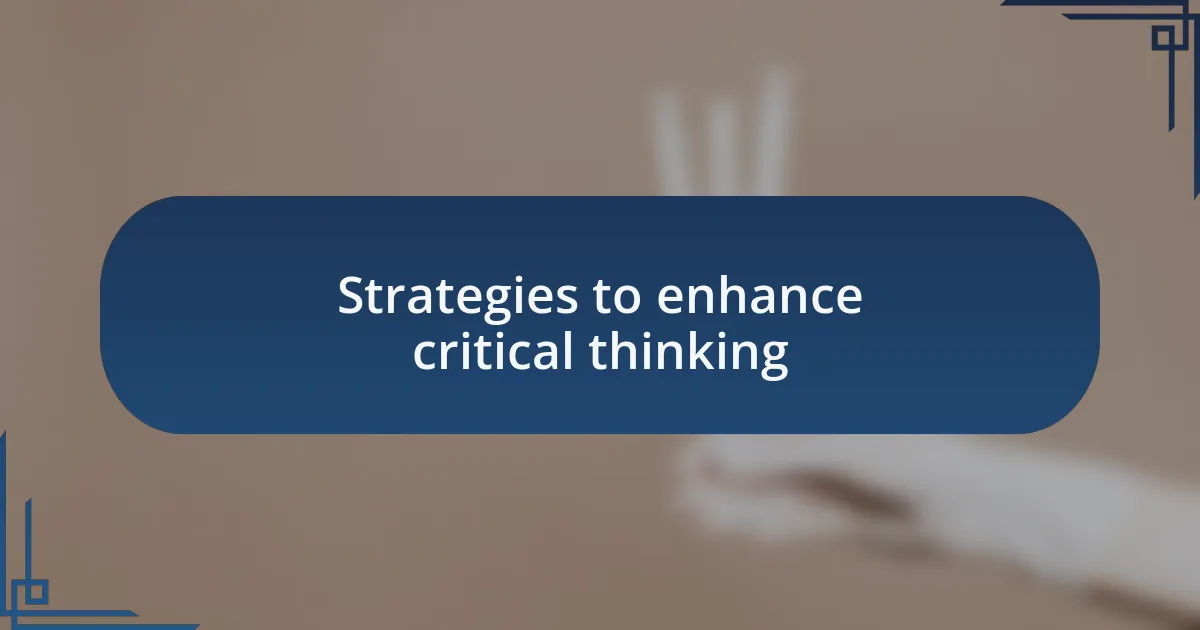
Strategies to enhance critical thinking
One effective strategy I have found to enhance critical thinking is constant reflection on my experiences. After each clinical shift, I take a moment to journal about what went well and what challenges I faced. This practice not only helps me solidify my learning but also encourages me to question my decisions. How can I improve next time? This mindset transforms every situation into a valuable lesson.
Engaging in discussions with peers is another strategy I highly recommend. I often participate in case study groups where we analyze different patient scenarios together. Each member brings unique perspectives, which forces me to rethink my assumptions. Have you ever realized how someone’s fresh take can illuminate a blind spot in your thinking? Those moments of insight have truly deepened my understanding and fostered a collaborative learning atmosphere.
Lastly, I’ve found that reading broadly and diversely sharpens my analytical skills. By exploring topics outside of healthcare, I encounter various problem-solving approaches that inspire innovative thinking in my own field. I recall reading a fascinating article on behavioral economics that changed the way I view patient compliance. Isn’t it intriguing how ideas from seemingly unrelated fields can integrate into our practice and enhance our critical thinking?
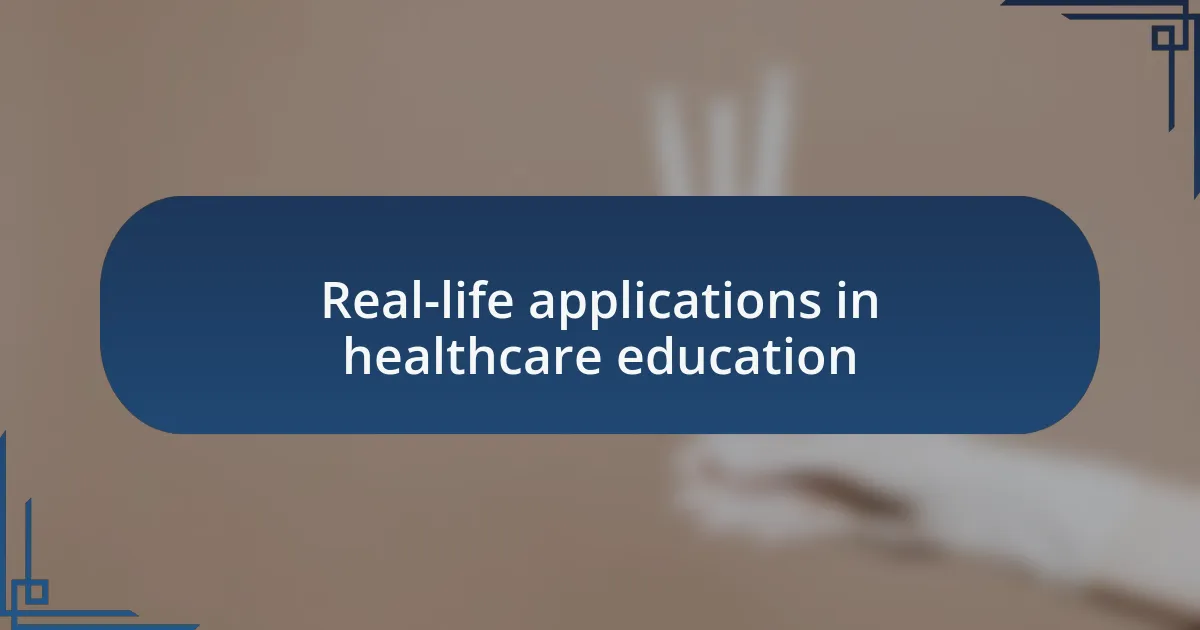
Real-life applications in healthcare education
Real-life applications in healthcare education can be vividly illustrated through simulations. I remember the first time I participated in a high-fidelity simulation involving a cardiac arrest scenario. The adrenaline rush was palpable, but beyond the excitement, the experience compelled me to think critically about my responses. Why did I make certain choices under pressure? This kind of practice not only hones technical skills but also encourages deep reflection on decision-making processes.
In another instance, I attended a workshop focused on ethical dilemmas in patient care. We examined real-world cases that pushed us to articulate our values and confront moral ambiguities. I found myself wrestling with questions such as, “What would I do if my beliefs clashed with patient autonomy?” This exercise forced me to evaluate not only my role as a healthcare provider but also my responsibility towards my patients. It was a pivotal moment that made me realize the importance of ethical reasoning in critical thinking.
Additionally, I’ve seen firsthand how project-based learning can bridge theory and practice. During a community health project, our team was tasked with addressing a local health issue. As we gathered data and strategized, I was struck by how critical thinking influenced our approach. We had to prioritize interventions based on both evidence and community needs. How did our discussions shape our final recommendations? This real-world engagement transformed theoretical knowledge into actionable insights, reinforcing the vital role of critical thinking in healthcare education.
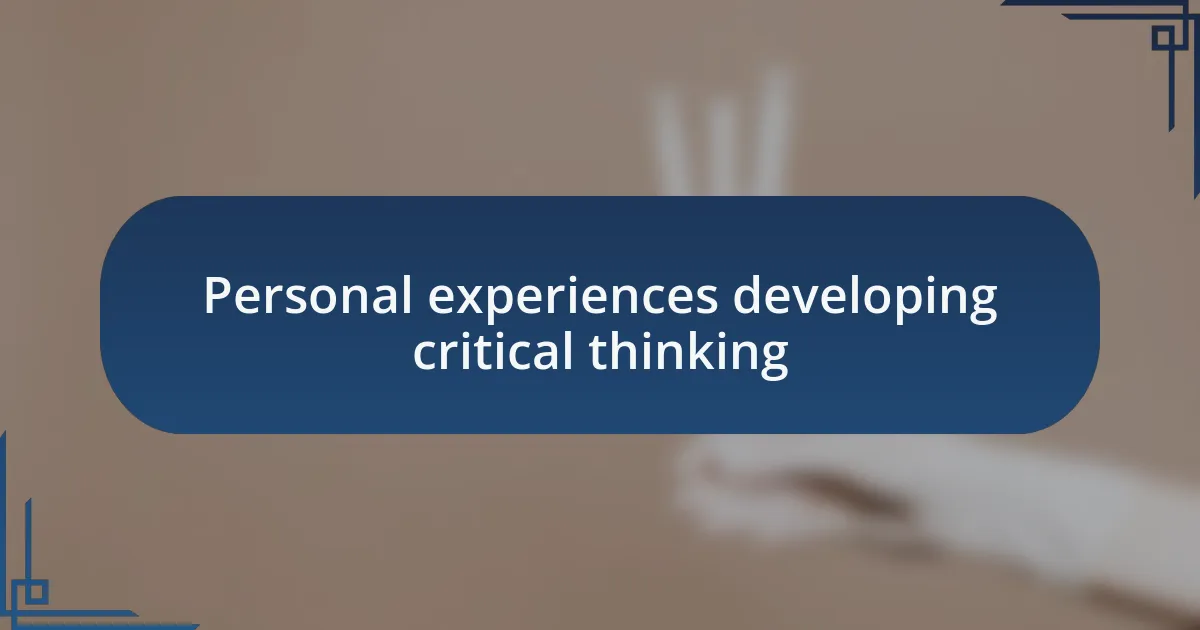
Personal experiences developing critical thinking
I remember a specific moment in my clinical rotations that profoundly shaped my critical thinking skills. We had a patient present with vague symptoms, and as I watched my colleagues hastily jump to conclusions, I felt a sense of unease. It led me to ask, “What if there’s more to this picture?” This moment sparked a deeper inquiry into symptom analysis and taught me that sometimes the most critical thinking happens when we slow down and consider multiple angles before deciding.
During a group study session, we tackled complex case studies, each inviting varied interpretations. I distinctly recall debating a treatment plan for a patient with multiple comorbidities. As I listened to my peers, I felt both challenged and invigorated. I found myself pondering, “How can we weigh the risks and benefits while respectfully integrating the patient’s perspective?” This collaborative effort to explore diverse viewpoints really illustrated how critical thinking is not just about individual insights but also about engaging with others to expand our understanding.
Reflecting on my experiences in healthcare seminars, I vividly recall a discussion on emerging healthcare technologies. The rapid advancements made me question not just their efficacy, but also their ethical implications. I felt an intense curiosity coupled with concern—”Are we prioritizing innovation over patient care?” This push and pull between excitement and skepticism sharpened my analytical skills, demonstrating how critical thinking is essential in adapting to ever-evolving challenges in healthcare.
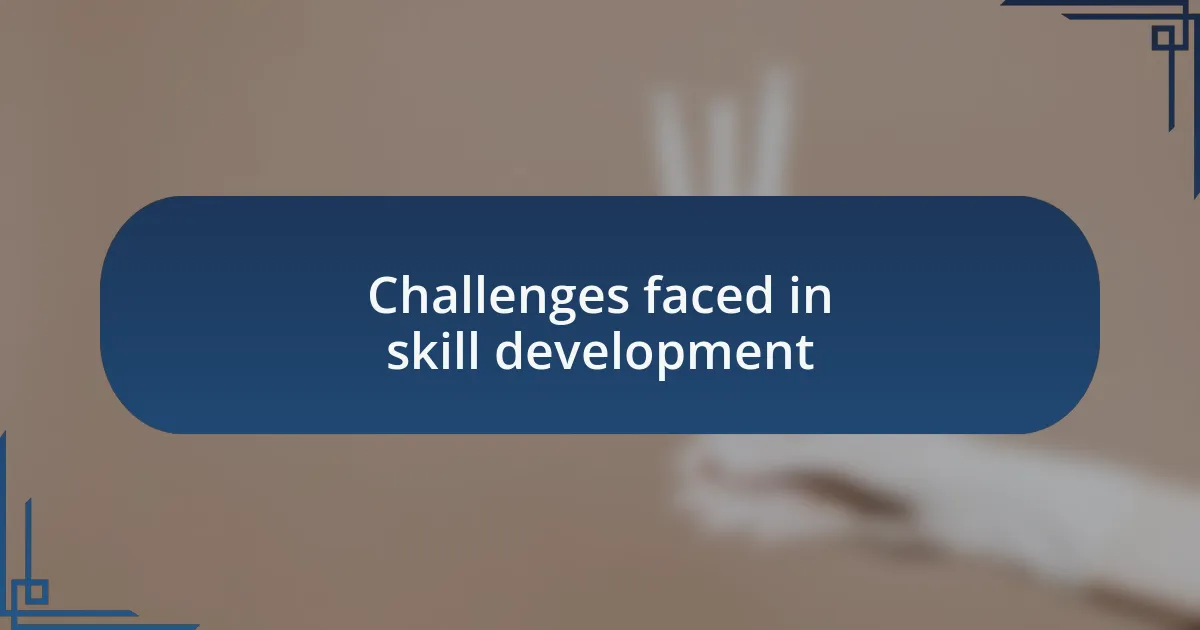
Challenges faced in skill development
Navigating the landscape of skill development was not without its hurdles. Early on, I encountered self-doubt during my first critical thinking workshop. I remember feeling overwhelmed by the intensity of the discussions; it felt like every question posed revealed how much I didn’t know. That initial discomfort pushed me to rethink my assumptions, but it was tough to accept that discomfort as part of growth.
Another challenge I faced was the phenomenon of information overload. During lectures, I would often find myself bombarded with numerous theories and case studies, struggling to sift through the noise. I would ask myself, “How can I possibly integrate all this knowledge effectively?” It took time and practice to learn how to distinguish valuable insights from mere information, teaching me that critical thinking isn’t just about acquiring facts—it’s about knowing which ones are worth consideration.
I also found that collaboration sometimes felt like walking a tightrope. In group discussions, differing opinions could lead to friction, especially when someone disagreed with my perspective. I remember an instance where I grappled with criticism regarding my approach to a case study. Initially, it stung, but reflectively, I realized that embracing constructive feedback was a crucial component of refining my thoughts. How do we grow without confronting our limitations? This question became central to my ongoing journey in developing my critical thinking skills.
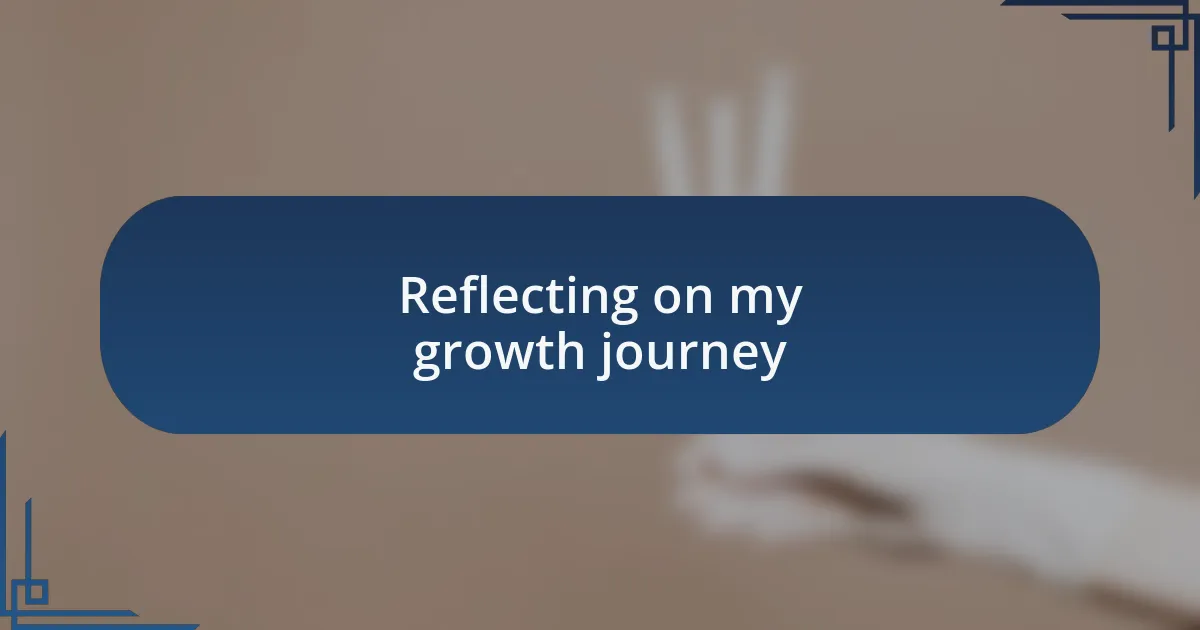
Reflecting on my growth journey
Reflecting on my growth journey reminds me of the many turning points that shaped my understanding of critical thinking. There was a moment during a particularly challenging case study when I finally connected the dots between theory and practice. As I dug deeper into the material, I felt a sense of liberation; I was no longer passively absorbing information but actively engaging with it. Was this what it felt like to truly understand?
One of the most profound realizations came when I recognized the value of self-reflection. After engaging in discussions, I started setting aside time to ponder what I had learned and how I felt about it. I vividly remember sitting with a notebook, jotting down my thoughts late at night. It was a cathartic process; each insight was a stepping stone toward deeper comprehension. How can we grow if we don’t take time to acknowledge our journey?
As I continue to reflect, I see my growth as a mosaic made up of both successes and setbacks. There were days when I felt like I was moving backwards, questioning my choices and the skills I was honing. But then, I would encounter a breakthrough moment—perhaps a comment from a peer that sparked a new idea or a concept that finally clicked. Those moments reminded me that growth isn’t linear; it’s a winding path, rich with lessons that form the foundation of my critical thinking abilities.